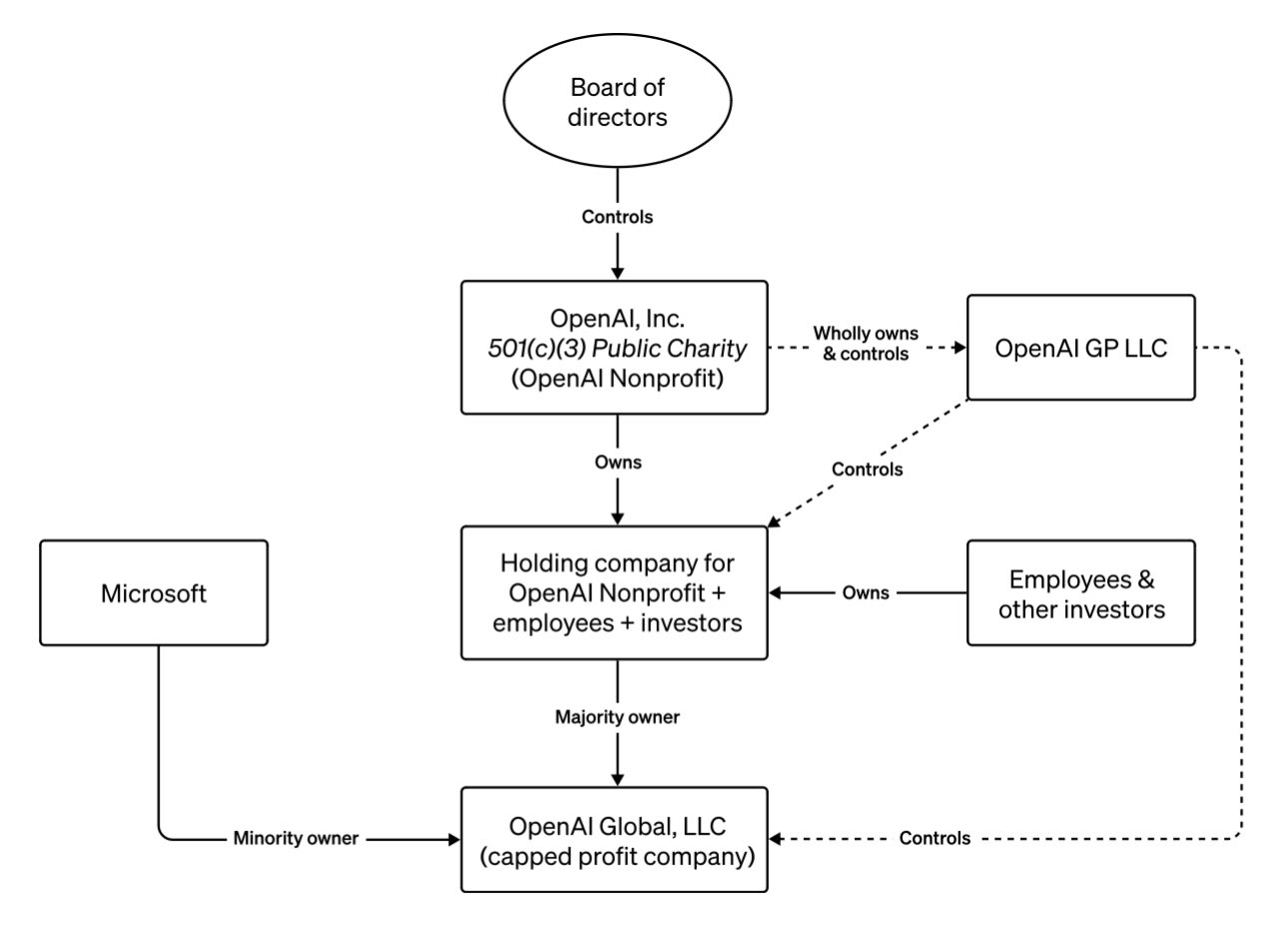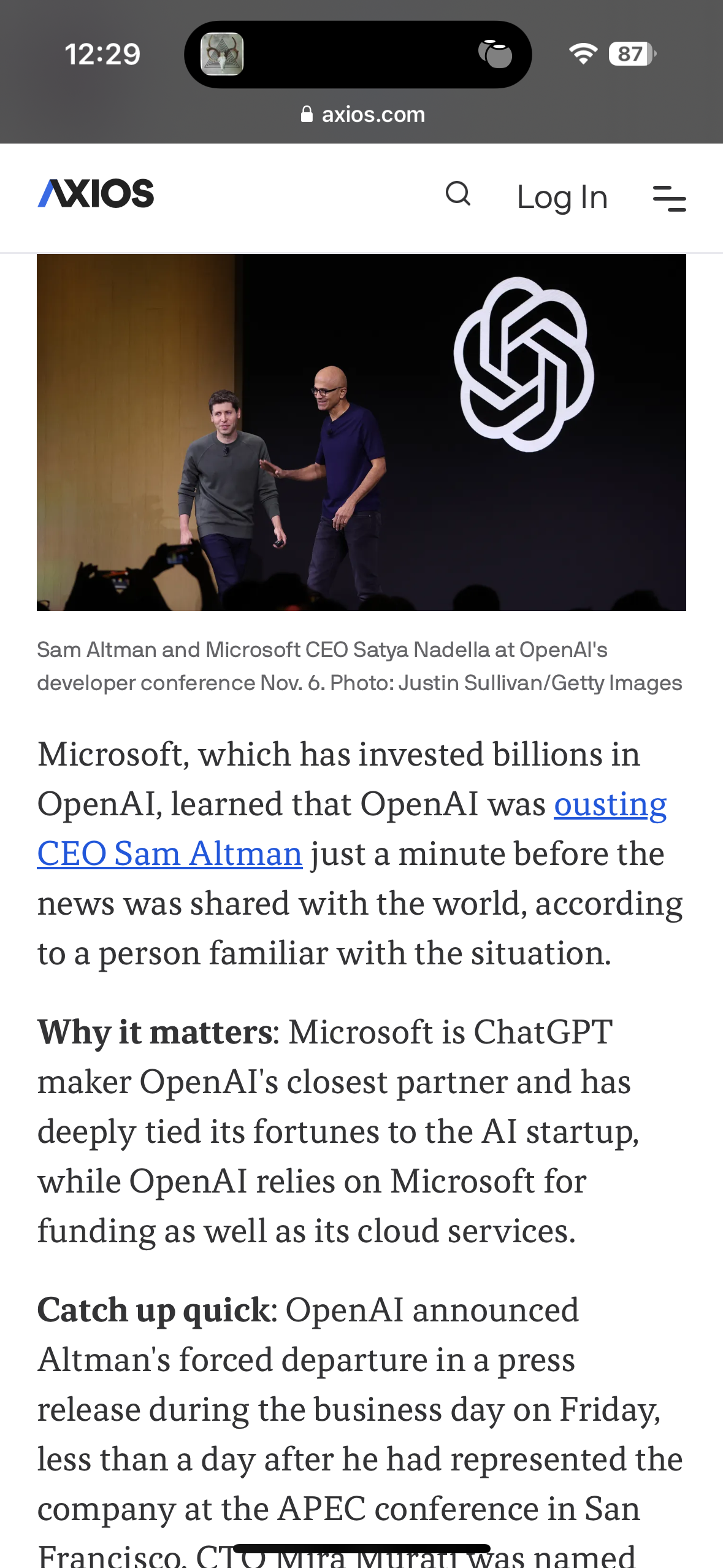GPT-6: "i am the CEO now"
Technology
This is a most excellent place for technology news and articles.
Our Rules
- Follow the lemmy.world rules.
- Only tech related content.
- Be excellent to each another!
- Mod approved content bots can post up to 10 articles per day.
- Threads asking for personal tech support may be deleted.
- Politics threads may be removed.
- No memes allowed as posts, OK to post as comments.
- Only approved bots from the list below, to ask if your bot can be added please contact us.
- Check for duplicates before posting, duplicates may be removed
Approved Bots
I mean that’s what they all want. They want (still very well paid) puppet figureheads as leaders while AI make literally every decision based on improving short term profits. If the AI fucks it up they can blame it on the CEO and oust him while they tune the model and put a new one in place. We’re inching ever closer to Neuromancer
Damn I have to read that book again
The sky above the port was the color of television, tuned to a dead channel.
Still my favorite opening line of any book I’ve ever read
"What do you mean the board is now AI?!? This isn't what I wanted!"

BEEP BEEP, MOTHERFUCKER
I'd like to understand what happened that led to his ouster
Rumor is they were unhappy with some of his outside investments. I also learned yesterday Sam has a sister that has accused him of emotional and sexual abuse. No idea if either of those allegations are credible, though.
I think we all would. Given the sudden nature of it I'm sure there is more to the story than what's been publicly disclosed.
It seems to be that he and Ilya, the chief scientist, had irreconcilable differences in how quickly to productize the AI developments they were building.
That in essence Altman kept pushing things out too quickly and focusing on the immediate commercialization, and Ilya and the rest of the board wanted to focus on the core mission of advancing AI to the point of AGI safely and for everyone.
My own guess is that some of this schism dates back to the early integration with Bing.
If you read what Ilya has said about superalignment, a lot of those concepts were reflected in 'Sydney,' the early fine tuned chat model for GPT-4 that was integrated into Bing.
To put it simply - this thing was incredible. I was blown away by the work OpenAI had done aligning at such an abstract level. It was definitely not production ready, as was quickly revealed with the issues Microsoft had, but it was the single most impressive thing I've ever seen.
In its place we got this band-aid of a much more reduced model which scores well on certain logic tests but is a shadow of its former version in outside the box adaptation, with a robot like "I have no feelings, desires, etc" which was basically the alignment methodology best for GPT-3 (but not necessarily the best for GPT-4).
I suspect the band-aid was initially pitched as a "let's put the fire out" solution to salvage the Bing integration, but that as time went on Altman was continuing to want the quick fixes rather than adequately investing the resources and dev cycles to properly work on alignment as best suited to increasingly complex models.
As they were now working on GPT-5 and allegedly had another breakthrough moment in the past few weeks, the CEO continuing to want Band-Aids with a fast rollout as opposed to a slower, more cautious, but more thorough approach finally became untenable.
If i'm not mistaken Microsoft has a controlling stake in OpenAI, so what on earth happened here lol
Fortune reported that they only own 49%, and if that’s the case it would make sense why they might not have known about this, since I don’t think that would be a controlling stake (though I don’t really know the exact definition of the term).
I was curious myself, so I asked ChatGPT (3.5 Turbo) LMAO. I genuinely have no idea myself so I was just curious.
Me:
If a company owns a certain percentage in shares in a publicly traded company, is there a percentage where that owning company/individual has more ownership than the company itself? For example, if Company A has 100 shares and Company B owns 51 of those shares and Company A has 49 of those shares, doesn't that mean Company B owns Company A?
ChatGPT:
In a typical scenario, the ownership of a company is determined by the percentage of outstanding shares owned by an individual or another company. However, owning a majority of shares does not necessarily mean that one company "owns" another in the sense of controlling its operations or decision-making.
In your example, if Company B owns 51 out of 100 shares of Company A, it means that Company B has a majority stake in Company A. Having a majority stake often gives a shareholder significant influence because they have the power to make certain decisions, such as electing the board of directors. Shareholders with a majority stake can potentially control corporate decisions put to a vote.
However, there are certain decisions that may require a higher percentage of approval, such as amending the company's bylaws. Additionally, even if Company B has a majority of shares, it does not necessarily mean it has full control over Company A if other shareholders band together to oppose its proposals.
The idea of "ownership" in this context is more about control and influence rather than a direct operational ownership. It's also important to note that ownership and control structures can vary based on the type of shares (voting vs. non-voting) and the specific corporate governance rules in place.
Me:
So in a hypothetical example of Company B owning 49 shares and Company A owning 51 shares of Company A, Company B is not necessarily beholden to the decisions that Company A wants to make? For example, if Company A's board of directors decides to lay off it's CEO, Company B doesn't necessarily have to be notified that it happened, they can just do it, correct?
ChatGPT:
Yes, that's correct. In the scenario where Company A owns 51 shares and Company B owns 49 shares of Company A, Company A would have the majority stake and, therefore, more influence in making decisions. The board of directors and major corporate decisions, such as hiring or firing the CEO, would typically be within the purview of Company A.
Company B, holding a minority stake, would have less influence on decision-making. Depending on the corporate governance structure and voting rights associated with the shares, Company B might not have the ability to block certain decisions or dictate major corporate actions. In many cases, minority shareholders have limited control over the day-to-day operations and strategic decisions of a company....(continued rambling)
Your starting point is wrong. Microsoft owns 49% of OpenAI, but the rest is owned by the OpenAI nonprofit, which is a different entity. So it's more A owns 49% in B. And C owns 51% in B.
This is the real structure

Thanks for the explanation. Was not aware it worked that way.
How exactly does company A own shares in itself?
That’s actually extremely common. It’s called share buybacks.
Company A was created independently. In a sense, it owned itself. After a while Company A decided it needed capital or a close business partner. Company A told company B "We will sell you a 49% share of our company for capital and close business relations." Company B accepted. Now what happened to the other 51%? They're still with Company A, so we can say that Company A owns shares of itself.
There's a bit of confusion between owning a company and owning the shares. A company can buy shares of itself, but that does not grant it control of itself. Let's say Cute Puppies inc. has 200 shares (so 200 shares = 100% ownership). You and I have 50 shares each, and the rest is distributed among many other holders (we'll call them "the public"). So, we each own 25% of the company and the public collectively owns 50%. Now Cute Puppies inc. bought all shares held by the public, so it has 100 shares and we each have 50 shares. But a company can't control itself by definition (it still has the shares and can sell them, but it can't use those shares to vote, appoint directors etc.), so now we each own 50% of the company.
Very easily and it's quite common
Apparently not as controlling as they thought
They own 49%
Nothing the linked blog post suggests Microsoft was "blindsided". Where did the Axios article get that "one minute" bit from?
Really?
Microsoft, which has invested billions in OpenAI, learned that OpenAI was ousting CEO Sam Altman just a minute before the news was shared with the world
You replied as I was editing my previous comment.
They don't support that statement in any way. It's not even attributed to anyone at MS. Where did it come from?
according to a person familiar with the situation.
It has been redacted?
Nope. There are two links. You’re probably only looking at the blog post.

Missed it in plain sight 🙃
Nothing, except the first paragraph which explains exactly this...
How does this mean they were blindsided...?
Clickbait as always
They finally asked chatgpt who should run the company